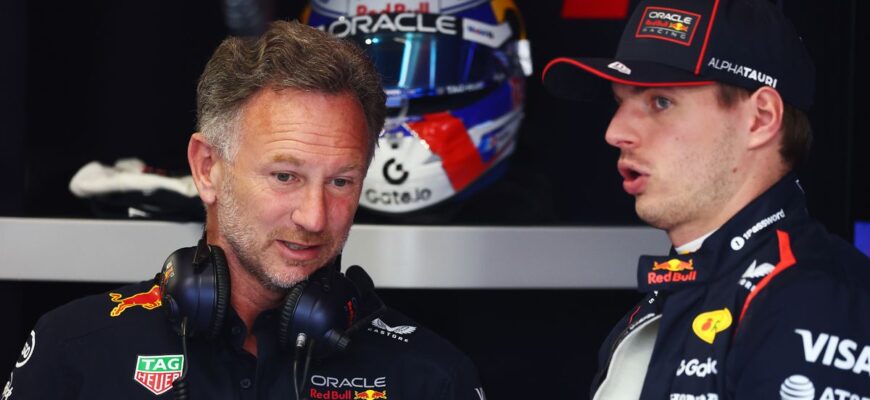The Formula 1 paddock often thrives on rumor and speculation, yet few events detonate with the force of a long-serving team principal’s abrupt departure. Christian Horner, the man who steered Red Bull Racing since its inception in 2005, overseeing an era of dominance marked by six Constructors` and eight Drivers` Championships, has been removed from his position.
While the official reasoning remains undisclosed, the move follows a period of significant internal tension and external scrutiny. In the wake of this seismic shift, attention immediately pivots to the team`s most valuable asset: reigning world champion Max Verstappen. And according to seasoned F1 analyst Martin Brundle, this dramatic change might yield an unexpected outcome regarding the Dutchman`s future.
Brundle`s Counter-Intuitive Take
Conventional wisdom might suggest turmoil at the top prompts a star driver to eye the exit. However, Sky Sports F1`s Martin Brundle presents a contrasting view. He posits that Horner`s sacking could actually make Max Verstappen “more likely” to remain at Red Bull. This perspective cuts against recent narratives, particularly given persistent rumors linking Verstappen to Mercedes.
Brundle, acknowledging Horner`s impressive two-decade tenure and success, notes that the situation “is not completely out of the blue.” He points to underlying issues within the team structure, suggesting that the power vacuum and subsequent struggles following the death of Red Bull co-founder Dietrich Mateschitz in 2022 laid the groundwork for instability. Mateschitz, as a 49% owner, held ultimate authority, and his absence appears to have fractured the previously cohesive leadership.
Internal Dynamics and External Pressure
The past year and a half haven`t been smooth sailing for Horner, even amidst on-track success. A widely reported public feud between Christian Horner and Max`s father, Jos Verstappen, added fuel to speculation about Max`s potential dissatisfaction and future at the team. While Red Bull secured another drivers` title in 2024, the competitive landscape shifted, with rivals closing the performance gap. This context, combined with the public tensions, kept the driver market rumor mill churning.
Mercedes team boss Toto Wolff has openly admitted to engaging in “conversations” with the Verstappen camp, a clear signal of interest from the Silver Arrows, who will have a vacant seat following Lewis Hamilton`s move to Ferrari in 2025. This external courting only amplified the perceived fragility of Verstappen`s commitment to Red Bull.
Why Staying Might Become More Appealing
Brundle`s analysis centers on the personal aspect of the internal conflict. With a key figure removed, he suggests the source of friction between the team principal and the Verstappen family might be eliminated, easing personal tensions. Max himself has frequently expressed a desire to potentially see out his illustrious career with Red Bull, the team that brought him into F1 and delivered his championships.
Furthermore, Red Bull is embarking on a monumental project: developing their own powertrains for the radical 2026 regulations. This transition represents perhaps the most significant technical challenge in modern F1 history. Christian Horner was deeply involved in steering this crucial venture. While his departure creates uncertainty, Verstappen`s existing ties and understanding of this project could be a factor in his decision-making. There is also the looming detail of Verstappen`s potential exit clause, reportedly tied to his championship standing at the end of July, adding an immediate deadline to the speculation.
If the removal of Horner stabilizes the team politically and reassures the driver regarding the internal environment, committing to the challenging but potentially rewarding 2026 project at a team he knows intimately might be perceived as the more favorable path compared to joining a different outfit amidst a similar period of regulatory upheaval.
A New Era Under Mekies
Red Bull`s future leadership rests on Laurent Mekies, formerly of their sister team, Racing Bulls. Mekies brings a diverse background, having worked within the Red Bull structure (as Toro Rosso engineer), held significant roles at the FIA (Safety Director, Deputy Race Director), and served as Sporting Director at Ferrari before returning to the Red Bull family. Brundle notes Mekies` successful tenure at Racing Bulls, suggesting his technical grounding aligns with a growing trend of team principals with engineering backgrounds.
The change at the top in Milton Keynes also coincides with other significant personnel movements, including Jonathan Wheatley, Red Bull`s highly-regarded Sporting Director, moving to Sauber (soon to be Audi). This suggests a broader reshuffling within the Red Bull organization and potentially across the paddock, illustrating the domino effect of such high-level changes.
Conclusion: Uncertainty Remains, but the Landscape Shifts
Christian Horner`s exit marks the end of a defining era for Red Bull Racing. While the full repercussions will unfold over time, Martin Brundle`s assessment offers a compelling alternative perspective on the immediate aftermath: the leadership change, potentially resolving internal rifts, might inadvertently strengthen Red Bull`s hand in retaining their superstar driver. The notoriously fluid world of F1 politics continues to surprise, and as Red Bull transitions under new management, the fate of Max Verstappen remains the central plot point in this unfolding drama.









